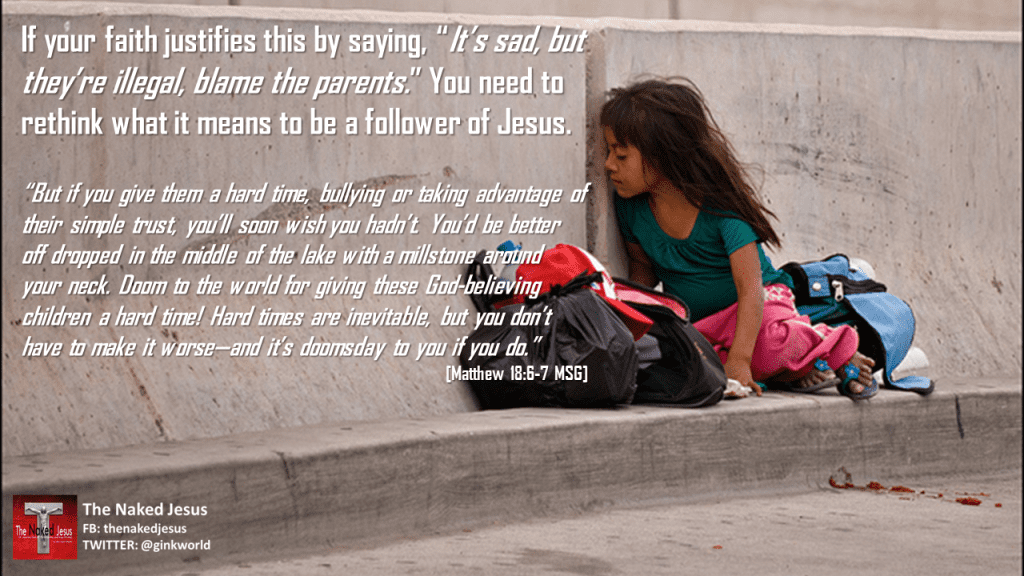 The other day I received a Facebook message from a pastor informing me that I was “not right with God” because I support the idea that all humans equal; I know, silly me. In his message, he must have used the word abomination about a million times; well, not a million times, but you get the idea. This got me thinking, how many times does the word abomination appear in scripture? So, I went on a hunt.
The other day I received a Facebook message from a pastor informing me that I was “not right with God” because I support the idea that all humans equal; I know, silly me. In his message, he must have used the word abomination about a million times; well, not a million times, but you get the idea. This got me thinking, how many times does the word abomination appear in scripture? So, I went on a hunt.
In the NIV the word appears only 8 times [3 times in the Christian Narrative and 5 times in the Hebrew Narrative], in the MSG it appears 15 times [once in Revelations and the rest in the Hebrew Narrative], in the NASB it appears 109 times [104 times in the Christian Narrative and 5 times in the Hebrew Narrative] and in the KJV it appears 148 times [142 times in the Christian Narrative and 6 times in the Hebrew Narrative]. While in the RSV the word abomination is used 134 times [only 4 times in the Christian Narrative].
Let’s face it, in the Hebrew Narrative there are a lot of things considered an abomination, a lot of things. Shell fish or any kind, blended fabrics, pride, lying, cheating, robbery, murder, adultery, charging interest, and injustice to the poor and foreigners are all considered an abominations. So, I guess my question is, why focus on marriage rights and equity? If we truly took all of the law seriously we should be boycotting Popeye’s, TJ Max, Bankers, Lawyers, and our immigration policies. Come to think of it, we should all be holding mass protests at Red Lobster and covering it with prayer. I have tried to ask my Evangelical and Fundamentalist [E&F] Why the “picking and choosing?” To be honest with you, their answers have not been very convincing. You see, they have created a formula where they can violate any law in the Hebrew Narrative they desire by simply moving it from place to place. Here is how it has been explained to me:
For the E&F the Law in the Hebrew Narrative is broken down into three sections; moral, civil, and ceremonial [which is interesting because modern Biblical Scholarship – Hebrew Scholars – have six sections to compose the body of the Torah, but that’s another article]. What the E&F crowd has determined is that when Jesus speaks of fulfilling the law, it was only concerning the civil and ceremonial laws and not the moral law; so, for them, the moral law still stands. In other words, we are required to follow the Hebrew Moral Law. Which works out great for the E&F, because it allows them to determine which Law must be followed [arbitrarily I might add] and those they do not have to follow. For example, for them the dietary rules would be seen as “ceremonial” and would no longer need to be followed. This idea leaves me with many questions: Is there not a “moral” side to the dietary laws? Why would the moral side of the law not be followed? If God saw them as an abomination in the Hebrew Narrative would it not still be an abomination? Did God change God’s mind? Did God decide that those ceremonial and dietary rules were no longer an abomination?
The Hebrew word Tow`ebah is translated as abominable, abominable act, abomination, abominations, detestable, detestable act, detestable thing, detestable things, loathsome, object of loathing. I keep hearing our more E&F cousins shouting about an “abomination in the eyes of God.” This got me thinking – and yes, that can be dangerous – What does God say is an abomination? Here is a short list of some of the abominations in the Hebrew Narrative:
Unclean things (Lev. 7:21 and Isa. 66:17)
Anything living in the water that does not have fins and scales
The fat from ox, sheep, or goat
Cheating (Mic. 6:10)
Lost souls (Rev. 21:8)
A proud look (Pro. 6:16-17)
A lying tongue (Pro. 6:17; 12:22)
Hands that shed innocent blood ((Pro. 6:17)
A wicked scheming heart (Pro. 6:18)
A sower of discord (Pro. 6:19)
Wickedness (Pro. 8:7)
A false balance or scale (Pro. 11:1)
The proud of heart (Pro. 16:5)
Justifying the wicked (Pro. 17:15)
Condemning the just (Pro. 17:15)
Re-marriage of former companion (Dt. 24:1-4)
Cheating others (Dt. 25:13-16)
Robbery (Ezek. 18: 6-13)
Murder (Ezek. 18: 6-13)
Adultery (Ezek. 18: 6-13)
Oppression of others, particularly the poor or vulnerable (Ezek. 18: 6-13)
Violence (Ezek. 18: 6-13)
Lending with interest to a brother (Ezek. 18: 6-13)
Hardness of heart (Ezek. 18: 6-13)
Injustice (Ezek. 18: 6-13)
Incest (Lev. 19: 6-30)
Eating Leftovers (Leviticus 19:7)
Checking Your Horoscope (Deuteronomy 18:10-12)
Burning Incense (Isaiah 1:13)
Cheating at Business (Deuteronomy 25:13-16)
Arrogance (Proverbs 16:5)
Oppressing the poor and needy, etc. (Ezekiel 18:10-13)
Interesting, all of those fall into the idea of what the F&E would see as the “moral law” – yet, I hear no one on the E&F side screaming about any of them. What say you?











